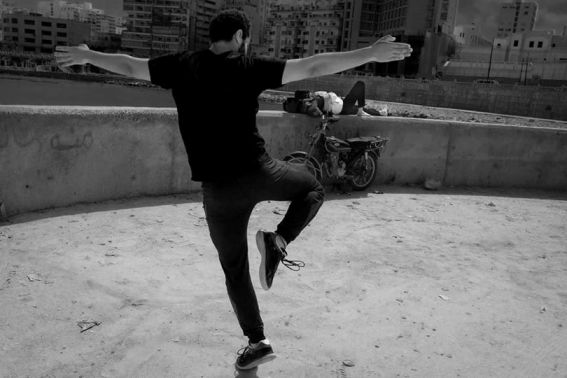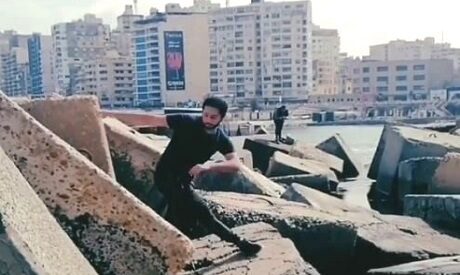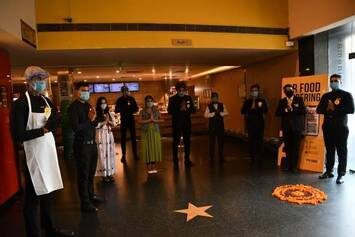The contemporary dancer Shady Emad takes advantage of Alexandria’s empty cornish where he continues to practice social-distancing but in public spaces.
Shady Emad, an Alexandrian contemporary dancer, has maneuvered his way out of closed spaces. Taking advantage of an empty cornish in Alexandria, he began performing in public spaces and posting videos of him dancing on his Facebook page.
Prior to the coronavirus outbreak, Emad used to jog and exercise in the morning on the cornish, a practice that now has been abandoned by many like-minded young Alexandrians. At the same time, the shutting down of all cultural venues makes it more challenging for dancers — and all artists alike — to continue with their regular artistic activities.
“I asked myself why not dance here,” he tells Ahram Online, referring to the Mediterranean city’s cornish which in regular days is filled with crowds, yet now it remains deserted due to the quarantine which aims to curb the spread of the coronavirus. It is by choosing the large empty public spaces that he continues to practice social distancing, albeit outside the confinement of the four walls of his apartment.
“These days are hard and extremely boring, but I believe that the world before the [pandemic] was also boring and trapped in fixed patterns and constructed in a deadly way that needed an extreme situation like this to change,” he writes in one of his most recent videos.
Before becoming a full-time contemporary dancer, Emad studied dentistry before switching to the Faculty of Tourism and Hotels at Alexandria University.
He began dancing in 2014. “I chose contemporary dance as a way to express myself and my opinions in a different way with different tools,” he reveals to Ahram Online.
The dancer adds that he was inspired by Nassim El-Raqs: A Contemporary Dance Festival which was held between 2011 and 2017 on the streets of Alexandria.
Launched by Egypt-based French visual artist Emilie Petit, Nassim El-Raqs aimed to empower contemporary dancers in Alexandria and design dances with different themes responding to everyday life challenges, presenting the majority of their works in public spaces.
“The festival hosted contemporary dance in public spaces as an alternative to theatres, and as such it could reach more people,” Emad adds.
Emad records his dances on the cornish and posts them on his Facebook page. One of the most recent videos (posted on 15 April) was shot on the cornish during the busy morning hours, while another (13 April) takes us to Gleem, one of the finest neighborhoods in Alexandria. Several other videos, which he began sharing since March, present Emad in a variety of public spaces.
By sharing the videos on social media Emad hopes to send a message to other artists: “Do not stop dancing regardless of the circumstances.
“The absence of traditional dance spaces shouldn’t prevent us from continuing our practice,” he adds.
The dancer adds Connected by Light hashtag to his videos, joining this way an initiative launched by Alexandria’s Jesuit Cultural Centre that aims at bringing artists and audiences together during the quarantine.
Spearheaded by the center’s director Fadi George, the initiative showcases artists in discussion, performances, and lectures on how to deal with quarantine realities and their impact on our psychology.

Photo courtesy of http://english.ahram.org.eg
This article was originally posted at http://english.ahram.org.eg on April 16th, 2020. To read the original article, click here.
This post was written by the author in their personal capacity.The opinions expressed in this article are the author’s own and do not reflect the view of The Theatre Times, their staff or collaborators.
This post was written by Hager Elhady.
The views expressed here belong to the author and do not necessarily reflect our views and opinions.


















